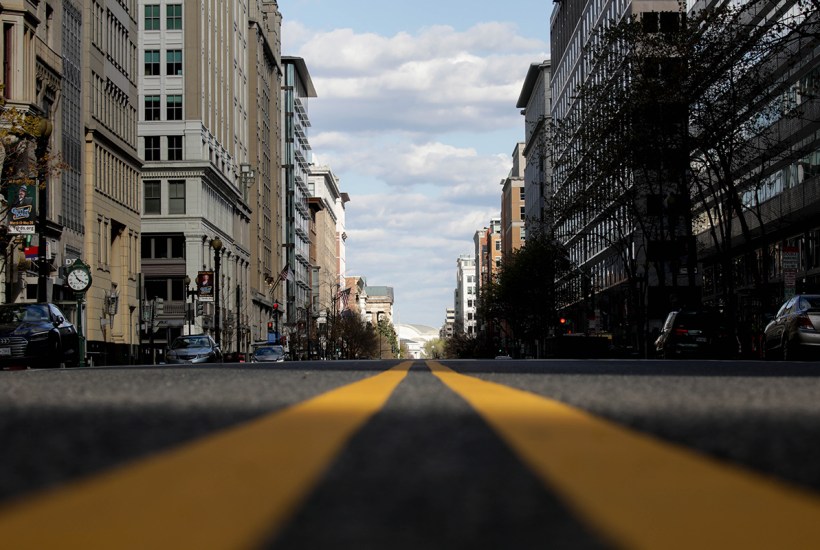This article is in The Spectator’s May 2020 US edition. Subscribe here to get yours.
Washington, DC
At the end of March, about two weeks into the coronavirus emergency, I looked out my window onto the street below and saw something that made me uneasy about the future of the country. There was a commotion down there. Two white teenagers were standing in the street with their hands up. A man — who looked and sounded like an East African immigrant — had stopped his car in the middle of the road and sprung out. I squinted to see what it was he was holding in front of him that made the kids look so alarmed.
It was a pizza. The kids had ordered it. The car was marked with a Domino’s insignia. ‘Whoa, whoa, man!’ said one of
the kids. ‘Take it easy!’ He was grotesquely corpulent. Hanging folds of pink belly were swinging wildly out of his clinging T-shirt.
The driver walked the pizza to the back of his car and laid it on the trunk, along with a paper bag. Now it was obvious what was going on. He had suggested to the boys that they take possession of the pizza in such a
way that they not make contact with him. That was the safest thing, given the epidemic — for him, for them and for all the customers he would have to serve during the rest of the day. Smart thinking. I thought, not for the first time that day, of the heroism of delivery drivers like this, who make it possible for people like these kids to stay home and ride out the storm in their rich neighborhoods.
That was not Fatty’s view. He just found the whole routine weird. He jostled past the driver and reached into the paper bag, and now, suddenly, he was angry. ‘Where’s the lava cake?’ he asked. ‘I ordered a lava cake!’ The driver mumbled. ‘Drive back to Tenleytown and get it, can ya?’ the kid threatened. ‘Can you make that a priority? Can you get me an extra one, too?’ The driver mumbled a little more and, looking scared, drove off.
Anyone who has read Defoe, Manzoni or Camus, or who can put two and two together, ought to realize that, wherever plague is, looting, strikes, war, hunger and other unrest are not far away. That evening on my street, you could have been forgiven for thinking there was less to fear from coronavirus than from standing between a fat American and a steaming box of pizza. But a situation where idlers try to boss around hardworking people risking their lives is not likely to hold for long. And where will that leave us?
***
Donald Trump’s understanding of epidemiology in general, and of this crisis in particular, appeared quite shallow right up until his announcement of emergency measures on March 11. His reference to coronavirus as a ‘Chinese virus’ was crude, it is true, though by then certain Americans were already referring to it by the even less decorous name of ‘Kung Flu’.
Still, Trump’s instincts have left him better armed than any president in living memory to confront an epidemic. Protecting borders is the thing Trump cares about most. It is also the most time-tested and effective way of fighting epidemics. Trump’s decision to limit the inflow of foreigners from China in January, as soon as news emerged from
Wuhan, turns out to have been the earliest constructive step any leader took in stemming the virus. It bought time. In January, one would have expected the virus to hit the US before it hit Europe.
There are moments when it is wiser and safer to keep people apart — that is just common sense. But as Trump’s foes have sought to politicize the epidemic, common sense is what they have declared war on. Joe Biden accused Trump of xenophobia for mentioning China.
A Georgetown University public health expert confidently tweeted that ‘germs don’t respect borders’. If this is true, it is true only in the sense that respecting borders is a human trait. Viruses don’t write novels or read Playboy or develop gambling addictions or say ‘for all intents and purposes’ until it gets on your nerves, either.
This viruses-don’t-respect-borders business is a perfect globalist slogan. It conveys absolutely nothing but aggressively enough so as to cow others into swallowing any inclination to stand up and disagree with you. It is what is called in zoology ‘display’.
But in fact, the scientist is wrong. This virus happens to travel on people. If people can be made to respect borders, viruses will ‘respect’ them too, in the sense that they will not cross them. If this is true of households, then it is true of nations.
***
There is an iron reality at work here that is very frustrating to the president’s detractors. At a time like this, action must be coordinated; coordinating action requires leadership, and in a presidential system, one is stuck with the leader one has. The press has long treated Trump as worse than the plague, and that view has not changed now that there is an actual plague to compare him to.
Trump was faulted in the early days of the outbreak for his ‘refusal’ to use the Defense Production Act of 1950 more aggressively, in order to get more ventilators for New York City. But what is the DPA? It’s a McCarthy-era tool devised during the Korean War (a war even less popular than the one in Iraq), in order to put American corporations under direct presidential control. They want Trump to have that? It is a measure of the media’s antipathy to Trump that as long as he refused it, they assumed it must be what the situation called for.
***
Get three months’ free access to The Spectator USA website —
then just $3.99/month. Subscribe here
***
New York governor Andrew Cuomo had become a national hero to almost half the country on the strength of two achievements: keeping up New Yorkers’ morale and not being Trump. Shortly after Trump ordered the Army Corps of Engineers to New York to construct several field hospitals, the New Yorker ran an article praising Cuomo for having ‘spurred the construction of field hospitals’. New York Times columnist Maureen Dowd ran a typical en-Cuomium under the title ‘Let’s “Kick Coronavirus’s Ass”’, telling us that, ‘In this nightmarish moment, we’re feeling warm and fuzzy about the cold and calculating Andrew Cuomo.’
But the press has been oppositional for so long that it has weakened its reputation for objectivity at just the time when the need for objective information is most dire. Last November 16, after the second day of impeachment testimony, the New York Times ran a headline in capital letters across the entirety of its front page reading: ‘Ex-Envoy to Ukraine “Devastated” as Trump Vilified Her’. The story was about former US ambassador to Ukraine Marie L. Yovanovitch having been made sad by one of the president’s tweets, and here the Times was treating it as if were the bombing of Pearl Harbor, the assassination of Kennedy or 9/11.
Barely months later, when every single day saw death tolls approaching those of 9/11, the press found it had cried wolf: it lacked the standing to convey that an epidemic cutting down Americans by the thousands was anything more serious than a reckless Trumpian tweet.
The great Yale economist Irving Fisher, a towering figure of the early 20th century, has long suffered from an opinion he expressed on the eve of the 1929 stock market crash that stocks had reached ‘a permanently high plateau’. In a similar way, a lot of today’s intelligent and credentialed people came unprepared for what has befallen us. If there is a Fisher-type statement for our own era, it might be the column published in the Financial Times on the day of Trump’s coronavirus speech, in which Robert Armstrong opined that coronavirus ‘is not the result of a flaw in the organization of the world economy, in the way people, goods and money flow across the globe. It is a global crisis, not a crisis of globalization’.
That sentiment has become less and less tenable with each passing day. The evidence from Hong Kong seems to be that the single most effective measure against contagion is mask-wearing. Yet masks were insufficiently available in all western countries, and wholly unavailable in most, because those countries had surrendered their production to China (along with the jobs of those who used to make them) in order to save two or three cents. Now China refused to export them; doctors in Bergamo and Brescia and Codogno were having to share masks meant to be discarded after treating every patient. What is that if not a crisis of globalization?
Italy never did close its borders or think to investigate the thousands of Chinese garment workers in the regions where the coronavirus was spreading fastest. Nor, until its own citizens were dropping like flies, did Spain limit the dozens of flight from Italy entering Barcelona and Madrid. Why not? Were those governments not even curious about what was going on?
It is common to describe ‘learned helplessness’ as a problem for the welfare-dependent: people on the dole lose the ability to conceive that they might improve their situation by getting a job. In the same way, at the start of the coronavirus epidemic countries had lost the habit of thinking it was ever a legitimate thing to enforce a border. In retrospect, the European refugee crisis of 2015 revealed that the continent would be unable to fight a contagion, should one ever arise.
There is no telling yet whether Trump will emerge from the coronavirus as a hero, a screw-up or something in between. But part of the confusion roiling American discussions is that the virus is proving the central part of the message on which the president was elected to be, at the least, reasonable. Globalization once seemed like it was all upside – a no-brainer. You get sushi and cheap Chinese toys in exchange for sovereignty, and what can you do with sovereignty? We are in the process of discovering the value, including the ‘money value’, of the sovereignty we’ve surrendered.
Christopher Caldwell is a contributing editor at the Claremont Review of Books and the author of The Age of Entitlement: America Since the Sixties. This article is in The Spectator’s May 2020 US edition. Subscribe here to get yours.
See the full story of Sovereignty rules on Spectator USA.<//>
Got something to add? Join the discussion and comment below.
Get 10 issues for just $10
Subscribe to The Spectator Australia today for the next 10 magazine issues, plus full online access, for just $10.




















Comments
Don't miss out
Join the conversation with other Spectator Australia readers. Subscribe to leave a comment.
SUBSCRIBEAlready a subscriber? Log in